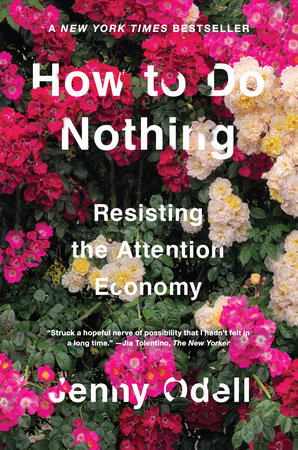First, a confession: I didn't actually finish reading How to Do Nothing by Jenny Odell. I ran into the expiration of my library loan, which of course I only ran into because I wasn't quite taken enough with the book to read it at a fast enough rate.
It's full of research, observations, and insights about our attention economy and what it might mean to resist it without abandoning everything, taking lessons from the hippie commune movement, early 20th century thinkers, artists from across time, and current research. It's interesting but, as can happen with nonfiction books, began to feel like it was simply repeating the same point over and over again.
Still, the point is worth noting: the attention economy is hurting our experience of being alive and human. We can resist this harm without running away and living in the woods by stepping back and finding ways to re-orient our perspective. By doing nothing.
Doing nothing here doesn't mean actual nothing. Odell doesn't advocate that we all cease to be. Here, doing nothing means participating in slower, analogue activities that connect us to people, places, and things and re-orientate our perspective on our surroundings.
"What would 'back to the land' mean if we understood the land to be where we are right now?"
Most "nothing" activities she discusses involve being in nature, taking in art, or being actively present with other humans. She talks a lot about birdwatching and the rose gardens near her home.
I couldn't help but notice that her examples of people who were able to stand apart in a notable way were all wealthy, famous artists or other people of independent means who had the freedom to make their own choices. She does recognize the privilege of, for example, being able to go sit in a rose garden for hours a day because it feels nice, but I didn't get a good counter that could apply to the rest of us who have to work every day.
Still, more time spent thinking critically about the attention economy is always a good thing (says the woman who is trying to find ways to build up a readership for her blog). And more time in nature, art, and friendship will certainly help make our lives better.
"Portraying the problem as one in which we just need to be more mindful in our interaction with apps can be likened to saying we need to be more mindful of our behaviour when interacting with the artificial intelligence algorithms that beat us at chess; equally sophisticated algorithms beat us at the attention game all the time."
- Devangi Vivrekar (quoted in How to Do Nothing)
Sign up for my email newsletter for a bi-weekly digest and bonus content!

